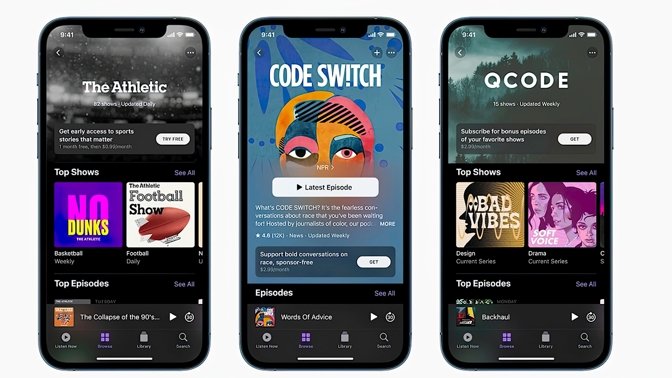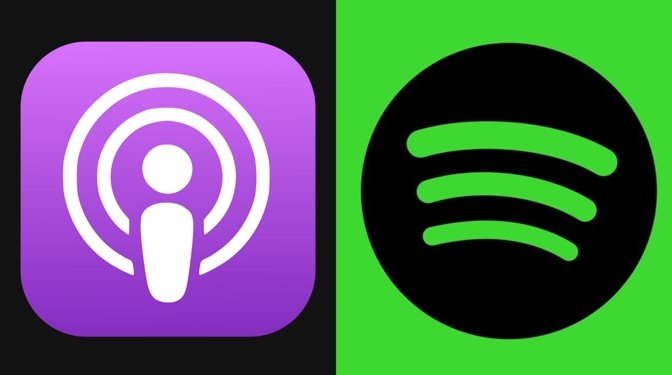Apple to take reported 30% cut from podcast subscriptions
Apple's new podcast subscription service will reportedly take a 30% revenue cut during podcast publishers' first year on the platform.

Apple's podcast subscription service launches in May
Apple announced its podcast subscription service at its "Spring Loaded" event on Tuesday. While the company was vague on financial details for podcasters, Recode has uncovered more particulars.
Apple's reported 30% cut applies to any subscription revenue made during a creator's first year using the service. After that, the fee drops to 15%. That reflects changes the company made to App Store revenue in 2020.
Apple wants its podcast producers to differentiate subscription content from their existing podcast selection. According to the Recode report, "That could mean ad-free shows or shows with extra content or brand-new shows that only exist on Apple."
"We're also introducing Apple podcast subscriptions, which enables you to unlock new content as well as additional benefits like ad-free listening, early access, and much more," said Tim Cook at Tuesday's event. "So, now you can help your favorite podcasters build their business and fuel their creativity."
Apple will allow podcast creators to set pricing. That can start as low as 49 cents per month in the U.S.
The new initiative marks the first time Apple has made money off of podcasts directly, despite being instrumental in the medium's mainstream growth. The Cupertino company first added podcast support to iTunes in 2005. The word "podcast" is a portmanteau of the words "iPod" and "broadcast."
Until now, Apple executives avoided capitalizing on podcasts because they hadn't viewed them as a significant revenue source. This approach was partially due to the company's privacy stance, limiting its ability to profit from advertising -- at least the data-driven type that tracks customers.

Spotify has invested heavily in podcasting, leading to a new battlefield for the two companies
Podcasts have exploded in popularity in recent years. Spotify and Amazon have both invested heavily in the medium. A market forecast in March predicted Spotify would overtake Apple in podcast listenership by the end of 2021.
Apple has also invested in boosting its podcast offerings. Earlier in April, it launched the first two episodes of "The Line," an original podcast that will be a precursor to a limited-series TV show set to arrive on Apple TV+ later in 2021.

Apple's podcast subscription service launches in May
Apple announced its podcast subscription service at its "Spring Loaded" event on Tuesday. While the company was vague on financial details for podcasters, Recode has uncovered more particulars.
Apple's reported 30% cut applies to any subscription revenue made during a creator's first year using the service. After that, the fee drops to 15%. That reflects changes the company made to App Store revenue in 2020.
Apple's new podcasting approach
Starting in May, Apple will let podcast creators sell subscriptions to listeners directly. The new service will not come with one single, overall subscription fee. Instead, users will be able to pay for each show to which they choose to subscribe.Apple wants its podcast producers to differentiate subscription content from their existing podcast selection. According to the Recode report, "That could mean ad-free shows or shows with extra content or brand-new shows that only exist on Apple."
"We're also introducing Apple podcast subscriptions, which enables you to unlock new content as well as additional benefits like ad-free listening, early access, and much more," said Tim Cook at Tuesday's event. "So, now you can help your favorite podcasters build their business and fuel their creativity."
Apple will allow podcast creators to set pricing. That can start as low as 49 cents per month in the U.S.
The new initiative marks the first time Apple has made money off of podcasts directly, despite being instrumental in the medium's mainstream growth. The Cupertino company first added podcast support to iTunes in 2005. The word "podcast" is a portmanteau of the words "iPod" and "broadcast."
Until now, Apple executives avoided capitalizing on podcasts because they hadn't viewed them as a significant revenue source. This approach was partially due to the company's privacy stance, limiting its ability to profit from advertising -- at least the data-driven type that tracks customers.

Spotify has invested heavily in podcasting, leading to a new battlefield for the two companies
Podcasts have exploded in popularity in recent years. Spotify and Amazon have both invested heavily in the medium. A market forecast in March predicted Spotify would overtake Apple in podcast listenership by the end of 2021.
Apple has also invested in boosting its podcast offerings. Earlier in April, it launched the first two episodes of "The Line," an original podcast that will be a precursor to a limited-series TV show set to arrive on Apple TV+ later in 2021.

Comments
I'm not sure I prefer this to having a curated podcast list that I pay a subscription for.
In fact you can have your cake and eat it because Apple still allows you to use podcast subscriptions and still have your existing baked in ads that your read out. I just do not see any down-side for publishers here.
It's the poor listener that I am worried about because they are going to get royally screwed. listers are going to get hoodwinked into subscribing to podcast channels that may peter out or only publish sporadically down the line, and its is going to be the same in-app payments and app subscription mess all over again.
Your last paragraph is interesting, though. So, what are the the terms of that 'contract'? So, let's say you do a weekly podcast, and then offer a subscription (say, ad-free) for $x per month/year. Can you skip some episodes?
Also, it is important to note Apple made a major change to how a follow (formerly subscribe) works for EVERY podcast listener using their app. It used to be that Apple Podcasts was just a directory the app used to search/browse. Once someone subscribed, it didn't matter if something went wrong in Apple's directory, or even if Apple banned you. Your subscriber would still look at the RSS feed and get new episodes. Now, the new version goes by the directory. If something goes wrong, or Apple kicks you (say you used some cuss words in a non-marked episode that gets reported), your podcast disappears and they won't get new episodes.
I *HIGHLY* recommend podcast listeners move to another app (like Overcast, or check out PodcastIndex.org list of some of the newer Podcasting 2.0 enabled apps) AND as a podcaster, make sure you are listed in the Podcasting 2.0 index (which is a bit convoluted process right now, but they are working on it).
I'm not sure Apple intends anything via these changes, but they seem to be messing stuff up, possibly because they don't even fully understand the industry.